Because Bermuda grass weeds grow quickly and are invasive, controlling them in lawns can be difficult. In my experience dealing with my neighbours’ Bermuda grass weeds, I’ve found that effectively controlling Bermuda grass involves strategic approaches.
Quick Answer
- In general, Bermuda grass can be killed by choking it out, solarization, cultivation, employing selective herbicides or natural solutions such as vinegar.
- For spot treatment, a powerful solution such as Ornamec 170 Grass Herbicide has yielded impressive results.
- For larger areas or agricultural settings facing invasions, I’ve successfully employed Fusilade II.
Both are reliable options capable of eliminating various grassy weeds. But read on to learn how to use them safely for your grass.
Is Bermuda Grass a Weed in Lawns and Flower Beds?
There are different varieties of Bermuda grass used for hay, lawns and golf courses. Apart from being useful in these ways, this tough grass is also an invasive weed, especially in tall fescue and zoysia lawns. You may find your beautiful flower bed being taken over by a fast-spreading Bermuda grass weed.
If you’re looking to get rid of Bermuda grass from your fescue or zoysia turfgrass, using a herbicide may be ill-advised, as the chemicals may harm the wanted grass varieties as well.
As for flowerbed weed invasions, you can go for any of the several chemical and mechanical measures to kill the Bermuda grass from your garden.
How to Kill Bermuda Grass in Your Lawn
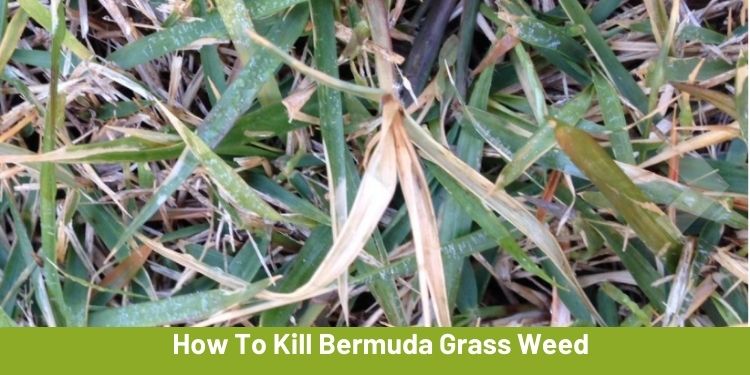
There still exist additional natural methods for removing Bermuda grass from your lawn or flower bed. For instance, you can solarize the unwanted grass, or use a method known as cultivation.
Here are the best ways to kill Bermuda grass weeds in your lawn:
1. Bermuda Grass Killer
You can quickly kill Bermuda grass using a herbicide that’s great at controlling perennial grassy weeds including torpedo grass, quackgrass, and Bermuda grass.
My go-to Bermuda grass killer in lawns is Ornamec.
- Ornamec Over the Top is designed for maintenance of landscape beds
- Reduces risk of ornamental plant injury
- Active ingredient begins to work within five days
Affiliate links and images pulled from the Amazon Product Advertising API on: 2024-07-26
For crops and larger areas, I like to use Fusliade II. Just follow the instructions on the label for proper coverage. I usually apply it in the spring and fall. Just depends on how heavy the coverage is. Here’s a detailed explanation of the best time to apply herbicides to kill Bermudagrass.
2. Solarization
Solarizing is best done during summer seasons when there’s usually an abundance of direct sunlight and soil heat. The heat and sun will ‘bake’ the grass and eventually kill Bermuda grass.
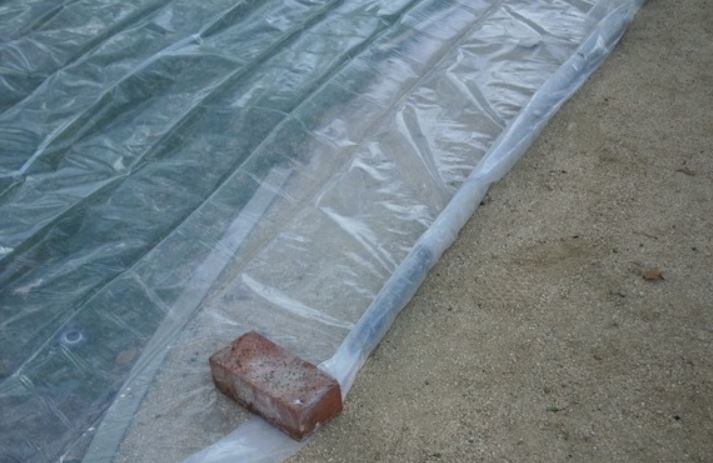
Here’s how to solarize and kill Bermuda grass in summer:
- Prep the Bermuda grass by mowing it just above ground level. This leaves you with less growth to work with.
- Stretch out clear plastic sheets over the overgrown Bermuda grass spots.
- Properly anchor your clear plastic sheets by securing down their loose perimeters with metal sticks or heavy stones every few meters.
- Allow the plastic sheets stay put for about a month-and-a-half. This allows enough time for the sun’s ultra-violet rays to entirely fry out and kill the invading Bermuda grass.
The clear plastic works by magnifying solar heat rays, causing the Bermuda grass to burn out.
Weighing down the plastic sheets with heavy rocks ensures that they won’t be pulled away by the wind.
3. Cultivation
This method is best used during the summer or in dry regions since Bermuda grass roots aren’t especially heat-tolerant. Cultivation to get rid of Bermuda grass entails plowing out your lawn soil up to a depth of about six inches.
This ensures that all underground roots are brought up to the surface, where they can then be left to dry out and die. Repeat the cultivation process fortnightly- for as long as necessary- to ensure that all Bermuda grass rhizomes and stolons (which is why it’s a fast-growing grass) are removed.
4. Choking out Bermuda Grass Weeds
It’s possible to choke out Bermuda grass from your lawn by mulching. This is best done using landscaping fabric. Alternatively, you can smother the Bermuda grass root system using a piece of cardboard.
To get rid of Bermuda grass naturally, go for the choking method. In general, there are two great ways of doing this as described below:
Using landscaping fabric
- Spread out the landscaping fabric sheet over the affected lawn area.
- Cut out holes in the sheet to create room for the wanted grass species.
- Spread a layer of mulch, sand, or gravel over the landscaping fabric for weight.
- Monitor the edges and cuttings you made on your landscaping fabric to ascertain that no new Bermuda grass has spread out.
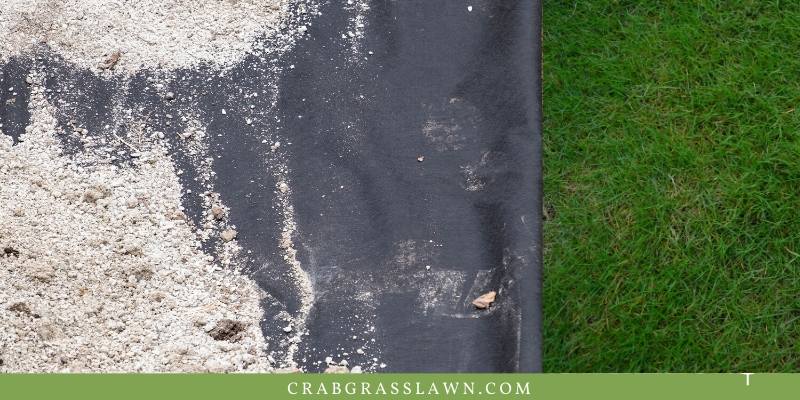
Mulching ensures that your wanted plants have access to moisture and nutrients.
Monitoring on a regular basis prevents the spreading of Bermuda weeds, which usually happens especially in instances where the installation of the fabric sheet wasn’t done properly.
You should, therefore, contract a lawn expert if you aren’t sure of the correct way to go about covering your lawn with landscaping fabric.
The Bermuda grass root growth should be contained within two months by the dense landscaping fabric.
Using pieces of cardboard
This is another effective sheet-mulching technique. The barrier created by the cardboard pieces over the Bermuda grass turf denies the unwanted plant of the sunlight that it needs for photosynthesis.
Here’s a step-by-step guide on how to effectively set-up a cardboard sheet mulch to kill Bermuda grass in your lawn:
- First, reduce the density of Bermuda grass you’re left to work on by using a lawnmower or weed-eater.
- Then, cover the affected area with a half-inch layer of compost to trigger biological activity.
- Flatten and stack two appliance cardboard boxes, such that they’re two layers thick.
- Lay the stacked cardboard atop the affected area, ensuring to anchor them with Sod Staples. This hampers the penetration of new Bermuda grass growth.
- Wet up all the cardboard pieces and apply three inches of mulching over the affected area.
- You should then leave the affected lawn area undisturbed for up to four months. This provides enough time for the stubborn Bermuda grass to choke out entirely.
How to Get Rid of Bermuda Grass Naturally
Killing Bermuda Grass with Vinegar
One effective way of killing bermudagrass weeds naturally is to use vinegar. Apply a 10% vinegar solution on the weeds to eradicate it organically.
Take caution with this method since vinegar is a non-selective natural weed killer. It can easily kill your lawn grass alongside the unwanted weeds.
Where to Buy Horticultural Vinegar?
Horticultural vinegar is readily available at your nearest garden center or online. The Calyptus horticultural vinegar is a whopping 15 times stronger than regular vinegar and can either be diluted up to 1:13 with water or used at full strength.
It is formulated for heavy-duty use and not human consumption and is produced in the USA with domestic ingredients.
- UNMATCHED PURITY AND CONSISTENCY: Experience the difference with our Calyptus 75% vinegar concentrate solution, crafted with the highest purity ingredients. Our concentrated vinegar quart solution consistently delivers the same smell, color, and results - every time. Shouldn't that be a given?
- NATURE'S POWER - AT YOUR COMMAND: Dilute up to 1:14 with water or use at full strength. One quart of Calyptus 75% pure concentrated vinegar delivers the equivalent power of fifteen quarts of standard vinegar. For those who know what they demand!
- SOURCED AND MADE IN THE USA: We take great pride in sourcing and manufacturing our ultra-powerful vinegar concentrate domestically, using high-purity ingredients, that are never imported, so you receive exactly what you think you are ordering, the first time.
Affiliate links and images pulled from the Amazon Product Advertising API on: 2024-07-26
It is important to understand the difference between the cooking vinegar stashed in your kitchen closet and vinegar used for gardening purposes.
Unlike regular vinegar, horticultural vinegar possesses a strong concentration of acetic acid to eliminate weeds in your lawn.
In terms of numbers, regular cooking vinegar has roughly just 5 percent acetic acid, whereas horticultural vinegar is much more at 20+ percent.
Even with a higher amount of acetic acid, horticultural vinegar may not kill all weeds but does kill some weeds better than others.
Unlike common pesticides that are absorbed by the plant’s root system and eventually kill the weeds, horticultural vinegar is absorbed by the cell walls of the leaf tissue, which leads to dehydration and wilting of plants, eventually killing just the top half of the weeds.
Therefore, if the weed your trying to get rid of grows an extensive root system, horticultural vinegar will not kill the weeds permanently.
Physically Remove Bermuda Grass
I’m not going to sugarcoat this, but physically removing Bermuda grass is a daunting task and even more strenuous if you have a sprawling lawn. After removing the Bermuda grass by hand, gather it and dispose of it properly.
Will Roundup Kill Bermuda Grass?
Roundup is one of the best bermuda grass killers. It contains glyphosate – a chemical known to get rid of many grass weeds.
- Spray it on the leaves to ensure maximum absorption of the herbicide.
- Apply roundup from spring to fall since doing so in January when bermudagrass is in a state of dormancy may not produce great results.
How Much Glyphosate to Kill Bermuda Grass?
When using Glyphosate, it’s important to apply the right mixture to get rid of Bermuda grass effectively. Unlike vinegar, Glyphosate is a hard worker because it travels through the Bermuda grass blades and right down to the roots to kill the entire plant.
- Mix 1.5 ounces (3 tablespoons) of Glyphosate concentrate in 1 gallon water to kill Bermuda grass.
- A single application of Glyphosate usually kills Bermuda grass but a repeat application may be needed.
- If the Bermuda grass isn’t dead in two weeks, apply another round of Glyphosate.
Selective Herbicide for Bermuda Grass
A herbicide that’s billed as selective will kill your targeted plants like Bermuda grass without killing your favorite plants.
Weed Killer for Bermuda Grass
There are several weed killers for Bermuda grass including Southern Ag Amine 2,4-D weed killer, Ortho WeedClear lawn weed killer concentrate, and BASF Drive XLR8 Crabgrass herbicide.
However, I don’t recommend using any of them since they contain harmful chemicals like dimethylamine salt, which can be hazardous.
There are two important factors to consider when choosing the best weed killer for Bermuda grass – buy one that is both effective and most importantly safe.
Epsoma is a natural and effective way of killing Bermuda grass and is made from corn gluten meal. Not only does it kill Bermuda grass at the root level but feeds your lawn to achieve a deep vibrant green color. You only need to apply Epsoma twice a year – in the early spring and fall for great results.
- Made from corn gluten meal
- Feeds lawns to ensure a deep, green color and prevents weeds by inhibiting root development in seedlings
- Apply twice per year, early spring and fall
Affiliate links and images pulled from the Amazon Product Advertising API on: 2024-07-26
Ornamec Bermuda Grass Killer
Ornamec is a post-emergent selective herbicide that apart from Bermuda grass treats a wide range of grassy weeds including crabgrass and foxtail.
You can mix Ornamec with water and directly apply the mixture to Bermuda grass, and expect results in about 48 hours.
- Ornamec Over the Top is designed for maintenance of landscape beds
- Reduces risk of ornamental plant injury
- Active ingredient begins to work within five days
Affiliate links and images pulled from the Amazon Product Advertising API on: 2024-07-26
Can You Choke Out Bermuda Grass with Fescue?
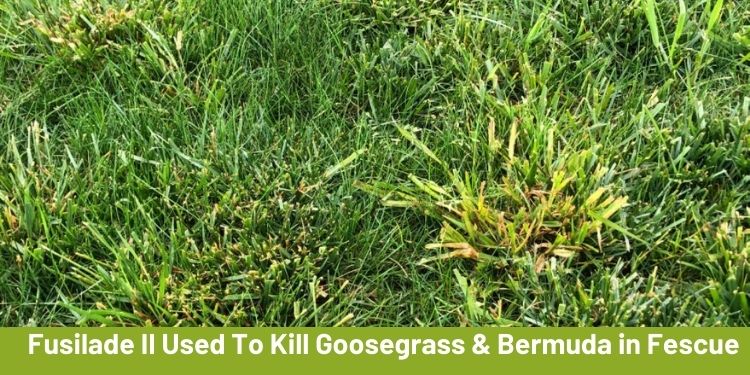
If you have a fescue lawn, you can choke out Bermuda grass easily by promoting its growth as well as killing the invading bermuda. To do this, apply Fusilade II herbicide, then mow your lawn more often to encourage fescue grass to grow thick and full, choking out Bermuda grass weeds.
How to Kill Bermuda Grass in Fescue Lawns
If the weeds are growing in your fescue lawn and taking over, there’s something you can do to get rid of them fast. Here’s a guide on how to get rid of Bermuda grass weeds in a fescue lawn.
1. Mow fescue lawn at a higher height
The first crucial step in suppressing the spread of Bermuda grass in your fescue lawn is to establish the perfect conditions for your tall fescue grass turf to dominate.
This can be achieved by mowing your lawn at a higher height (2-3 inches). This will reduce the amount of sunlight supply to the Bermuda grass, thereby reducing its chances of thriving.
2. Apply a Bermuda grass killer
The next step is to find a suitable herbicide. Most weed grass killers only eliminate top growth, leaving the Bermuda grassroots.
Bermuda grass is usually able to persist on tall fescue lawns- even after herbicide application- through these nutritional reserves that remain underneath the soil. They enable the weed grass to reestablish itself on your fescue lawn after a while.
To entirely kill off Bermuda grass from your fescue lawn, you need a systemic weed grass killer. Examples include Ornamec 170 Grass Herbicide and Turflon Ester. These herbicides contain chemicals that spread from the sprayed leaf blades to the roots, rhizomes, and stolons, killing off the whole Bermuda grass plant, not just the visible parts.
How to Get Rid of Bermuda Grass in Zoysia Lawn
The selective elimination of a perennial grass variety- like Bermuda grass- from another perennial lawn grass like zoysia grass can be a lengthy, tiring process.
Certain Bermudagrass control chemical solutions (like Bayer’s Fenoxaprop-p-ethyl) tend to kill off the wanted zoysia species. As I’ve talked about in the post already, a herbicide such as Fusilade II can be used to kill Bermuda grass in Zoysia lawns, but at a reduced rate.
Does Fusilade II Kill Bermuda grass?
This herbicide is great for killing Bermuda grass without killing zoysia grass in your turf. Fusilade II should be used with a high-quality non-ionic surfactant and applied once every month at a reduced rate.
According to a study done by the University of Georgia, repeating this process for two successive years will result in a significant reduction of Bermuda grass cover (35% to 7%). Meanwhile, your zoysia grass cover will be enhanced by up to 20% within the same period.
Killing Bermuda grass in flower beds
It’s also not unusual to find Bermuda grass creeping in on backyard flower beds where they aren’t needed. Whether it’s through its stolons or underground rhizomes, these grass species are known to spread fast.
If you want to prevent from taking over your landscaping, here are a few steps you should take to get rid of Bermuda grass weeds:
- Grab the ends of the Bermuda grass stolons, pulling them back towards the direction from which they’re spreading.
- Pull out roots attached to the stolon and growing into the ground underneath as well.
- Cut off the stolon once you’ve pulled it back to the edge of your garden/flower bed.
- Dig out/pull out the ends of Bermuda grass rhizomes, as this is the other way through which this weed grass can spread into flower beds.
If the above physical removal methods don’t stop Bermuda grass weed from growing in your lawn, try chemical weed grass removal.
We recommend the use of a glyphosate solution, which should be sprayed into the Bermuda grass rhizomes and stolons as well as along the garden edges to discourage new Bermuda growth.
When doing so, you might want to adjust the nozzle of your garden sprayer to a fine spray, and hold the nozzle to the targeted plants as close as possible. This is to minimize the chances of the herbicide’s overspray landing on your wanted garden plants and harming them.
Bermuda Grass Control
How to Stop Bermuda Grass from Spreading
Casually known as devil’s grass or couch grass, Bermuda grass is beloved by homeowners and landscaping professionals for its drought-hardiness and wear resistance. It’s also great as animal fodder.
However, when it is a weed in your lawn or yard, it spreads faster than most of the good turfgrasses such as St. Augustine, fescues and even bluegrasses.
If you want to manage the spread of Bermuda grass in your established garden, you can remove the unwanted grass by hand.
First off, you’ll have to mow the grass, as this is part of excavation preparation. It will enable you to gain easy access to the Bermuda grassroots.
Proceed to pull out the grass beneath the root by hand removal. Take care not to miss any live roots as they can reestablish themselves via the loose soil.
Finally, you should sift through the ground underneath the grass to remove any Bermuda grassroots left behind.
As a final piece of advice, homeowners should be aware that complete elimination of Bermuda grass from the lawn can be a lengthy process- taking even up to five years.
Success requires repeated application of the methods discussed, as well as frequent monitoring and maintenance to ensure there is no Bermuda grass regrowth. If not, you’ll only be able to achieve temporary Bermudagrass suppression, not total elimination.
How Long Does It Take to Kill Bermuda Grass?
The amount of time it takes to kill Bermuda grass depends on the treatment method.
How Long Does It Take Tenacity to Kill Bermuda Grass?
Once absorbed by Bermuda grass blades, Tenacity doesn’t take long to get to work. After application, it disrupts the photosynthesis of Bermuda grass and kills the grass completely within 3 – 4 weeks.
How Long Does It Take for Ornamec to Kill Bermuda Grass?
Ornamec stops Bermuda grass growth in as little as 24 hours and kills grass completely within 1 to 3 weeks.
How Long Does Roundup Take To Kill Bermuda Grass?
RoundUp kills the deepest roots of Bermuda grass within 7 to 10 days. The best time to apply RoundUp to kill Bermuda grass is in the fall because the active growth is slowing down during this time.
How Long Does It Take Vinegar to Kill Bermuda Grass?
Even though vinegar is a natural method to kill Bermuda grass, surprisingly it starts killing grass within 24 hours after application. The efficacy of vinegar to kill Bermuda grass depends on the weather and the solution’s concentration.
FAQs
How to Kill Bermuda Grass without Killing Grass?
The best way to kill Bermuda grass without killing grass is with a post-emergent selective herbicide such as Ornamec.
What Is the Best Tool for Removing Bermuda Grass?
The best tool for removing Bermuda grass is a garden fork. A garden fork allows you to lift the Bermuda grass roots without slicing them up.
Is Baking Soda Good for Bermuda Grass?
Baking soda is basically a salt that can be used to kill Bermuda grass.
How to Get Rid of Bermuda Grass Runners?
Bermuda grass is tough and persistent, owing to which you need a pesticide (generally Glyphosate) to get rid of the above-ground Bermuda grass runners.
Final Thoughts
There are several reasons for getting rid of Bermuda grass in your lawn and the good news is there are plenty of ways to achieve the task.
You can break a sweat and hand-pull Bermuda grass or simply apply a good herbicide such as Glyphosate to get the done right and in a fraction of the time it would take you remove the grass by hand or even with a gardening tool.
You may also like…
How to Get Rid of Mushrooms in Yard Once and for All
Hi, Alex Kuritz here. Growing up I remember that my family had one of the best lawns in the neighborhood. Richly green and lush. I did a lot as I grew up in terms of caring and tending for not only my family’s lawn but also my neighbors. I can say I have years of experience, and I am here to share it with you.

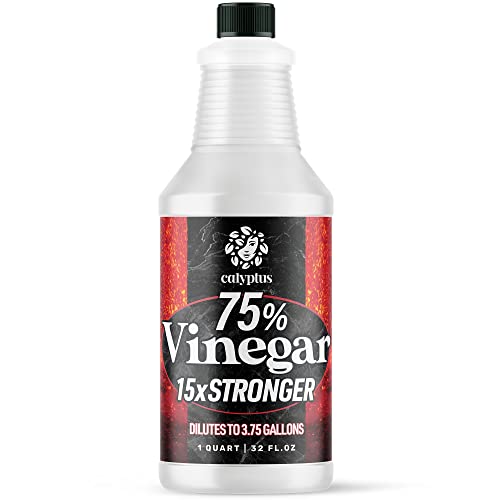




Great post. As we are planning to lay our new turf in our backyard, our turf supplier recommends Zoysia grass for our yard which is best to grow in both shade and sunlight with less maintenance, I prefer Empire Zoysia turf. Here I got ideas of Bermuda turf to use for the various purpose and soil types. Thanks for Sharing.
Don’t want to use Roundup or any carcinogens, since that causes cancer and I am a cancer survivor. If I use vinegar, will I still be able to grow my vegetable garden or should I just dry out Bermuda grass roots?
HI Cin, I’m with you there on Roundup. Yes if you use Vinegar you can still grown your vegetable garden. Just wait about a week after applying.
I am using several applications of Turflon Ester to kill the wire grass. It appears to be working. I am planning to do a core aeration and overseed later this month. DO I NEED TO DIG UP THE ROOTS BEFORE SEEDING? Thanks for your advice!
Digging up roots is usually the best advice.
Not having much success with the clear plastic, so put black over top. What are your thoughts?
Yes that could work but how big of an area are we talking about here?
Will vinegar kill my Zoysia grass if I use it to kill the Bermuda grass I. My yard?
Yes it could make it yellow as well if you are trying to control bermuda. You need to be super spot on if you are using vinegar.
We are making late beds in a Bermuda established lawn. Can we solarize all winter, with hole cut in weed blanket, without damaging planted crepe myrtles and arborvitae, in the area?
I’m thinking that should be ok. If you have done this already do you have any pics?
Our neighbors yard has a lot of Bermuda. It’s beginning to creep over onto our tall fescue. Which do you prefer “Over the Top” or “170 grass killer?”
How often can I repeat this treatment without hurting our fescue?
Thanks
I like the Ornamec 170 product for this type of issue. https://amzn.to/30mmmRQ
Hi Alex,
I have bermuda grass and crabgrass in my fescue lawn. What can I use to get rid of these grasses, which are taking over my lawn?
Hi Peggy, thanks for writing in. This is probably the easiest product to use to get rid of Bermuda in a Fescue lawn: https://amzn.to/3uBBfMM
I have Bermuda in my “parkway” between the sidewalk and the curb and it has now taken over at least half of the area measuring 15′ long and 5′ wide. I would prefer to use vinegar rather than caustic chemicals but: 1. wondering if it will be effective. 2. Will the “good” grass be able to recover or will it need to be reseeded? 3. Does the vinegar kill the root and stolens of Bermuda grass? 4. What is the vinegar solution? 5. How many applications of vinegar and how long to wait inbetween?
Hi Lori, check out this post for my vinegar recipe: https://www.crabgrasslawn.com/the-best-vinegar-weed-killer-recipe-natural-weed-killer-option/. I’m assuming you want to kill the entire area? This is non-selective so it will affect everything you put it on. You may need to treat it multiple times if you are trying to clear the area.